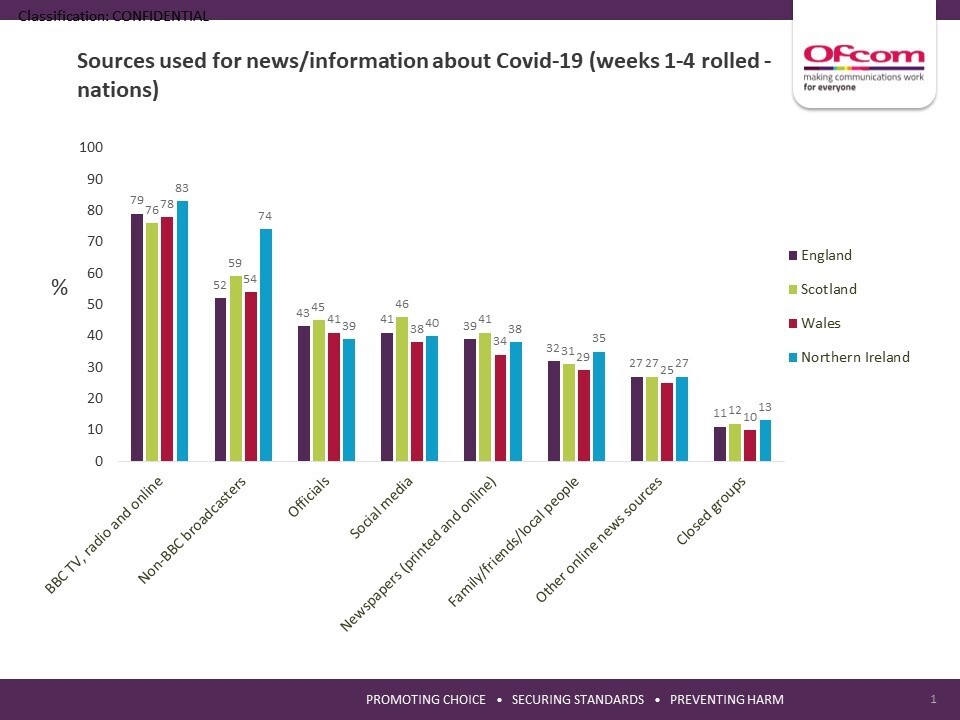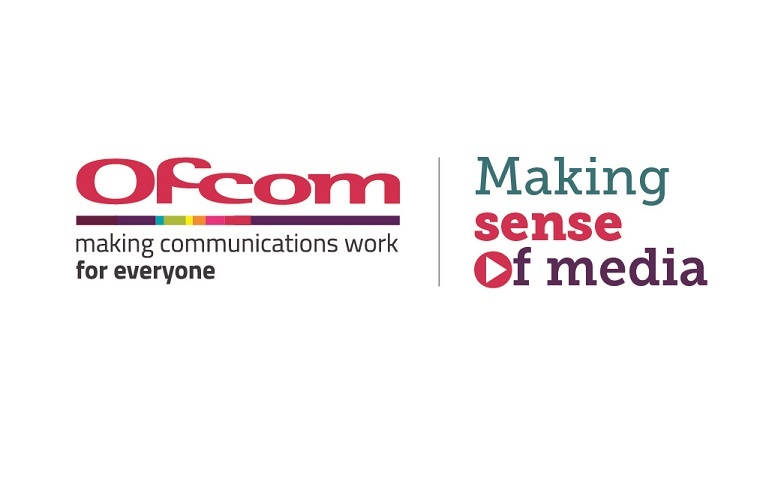By Rebecca Lennon, Regulatory Affairs Advisor at Ofcom.
As a response to the Covid-19 outbreak, Ofcom has been looking at how people are getting news and information about the crisis.
We have been carrying out an online Covid-19 news and information survey of 2,000 UK participants aged 16 and over each week since the beginning of the lockdown. We plan to continue this until at least the end of June. We are monitoring the news and information sources people are using to gather information about the pandemic, their levels of trust in these sources, their general attitudes, and the extent to which people are following government advice. We also ask whether people have come across any misinformation and, if so, how frequently and which types.
We are publishing a range of material relating to this survey, including interactive data showing the detailed results by different audience groups each week. We are presenting BARB and Comscore data alongside this, covering TV and online audiences respectively, to provide additional context and understanding of people’s consumption habits during this time.
We have “rolled” the data from the first four weeks of the pandemic to analyse by particular groups, including ethnicity as well as looking at any differences across the UK. This blog focuses on the results for Northern Ireland, compared to the other UK nations.
How we are accessing Covid-19 news
In the first four weeks of the UK ‘lockdown’ (27 March to 19 April 2020), results showed that almost all the UK online population accessed news about Covid-19 once a day or more, with 29% of Northern Ireland respondents saying they accessed news and information about Covid-19 five to nine times a day (28% England, 25% Scotland and Wales). 20% said they accessed Covid-19 news and information 10 or more times a day (16% England, 19% Scotland and 18% Wales).
Traditional sources (broadcasters, newspapers, radio) were the most-used source of news and information about Covid-19. BBC services were the most popular with 83% of Northern Ireland respondents using them (79% England, 76% Scotland and 78% Wales). In Northern Ireland, use of non-BBC broadcasters was higher than the other nations at 74%, (compared to Scotland 59%, England 52% and Wales 54%). Over half (55%) of Northern Ireland respondents tuned into UTV to access news.

When sharing information about Covid-19, 83% of Northern Ireland participants share information to colleagues, family and friends either in person or on the phone (England 76%, Scotland 77%, Wales 78%). Whilst 4 in 10 people were using social media as a source of information about the pandemic.
Consumption and attitudes towards misinformation
Across the first month of lockdown nearly half (48%) of Northern Ireland respondents say they had come across false or misleading information about Covid-19 in the previous week, which was in line with the other nations’ results (England 46%, Scotland 48%, Wales 43%). Just 5% of those who saw misleading information in the previous week said they forwarded or shared it. On seeing false or misleading information, the most common response in all nations was to do nothing about it, and 61% of Northern Ireland participants responded this way (England 46%, Scotland 48%, Wales 43%).
The most common pieces of misinformation respondents came across (from a select list) were ‘theories linking the origins or causes of Covid-19 to 5G technology’ and ‘drinking water more frequently’. More than a third (35%) of NI participants said they found it hard to know what is true and what is false about Coronavirus.
Ofcom’s response to Covid-19
Our research shows that, given the false claims about Covid-19 circulating online, some people are struggling to know who or what to believe. Access to accurate, trustworthy and credible sources of news and information has never been more important. So, with the support of Ofcom’s Making Sense of Media Panel and Network, we’ve collated a set of resources to help cut through the confusion and provide people with the tools to navigate news and information about Covid-19. These cover fact checking, information from official sources, support for parents and children, and actions that online platforms are taking in response to the crisis.
Finally…
There is a role to play for all media literacy practitioners when thinking about how people across the world are responding to the information they are seeing and how they decide on the next steps they should take.
We have gathered further information on media literacy activity across UK organisations, in response to Covid-19, in our recent Making Sense of Media Bulletin.
We would love to hear from you and would urge you to get in touch with comments and thoughts on your own activity. If you would like more information on any of Ofcom’s Making Sense of Media work, please email us makingsenseofmedia@ofcom.org.uk
